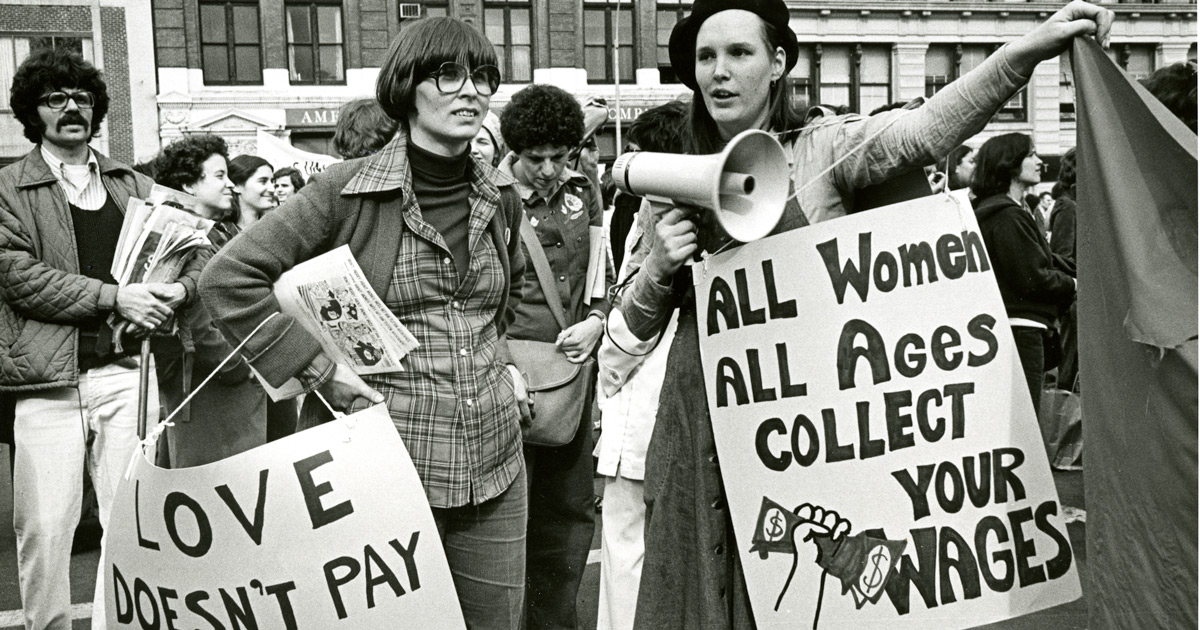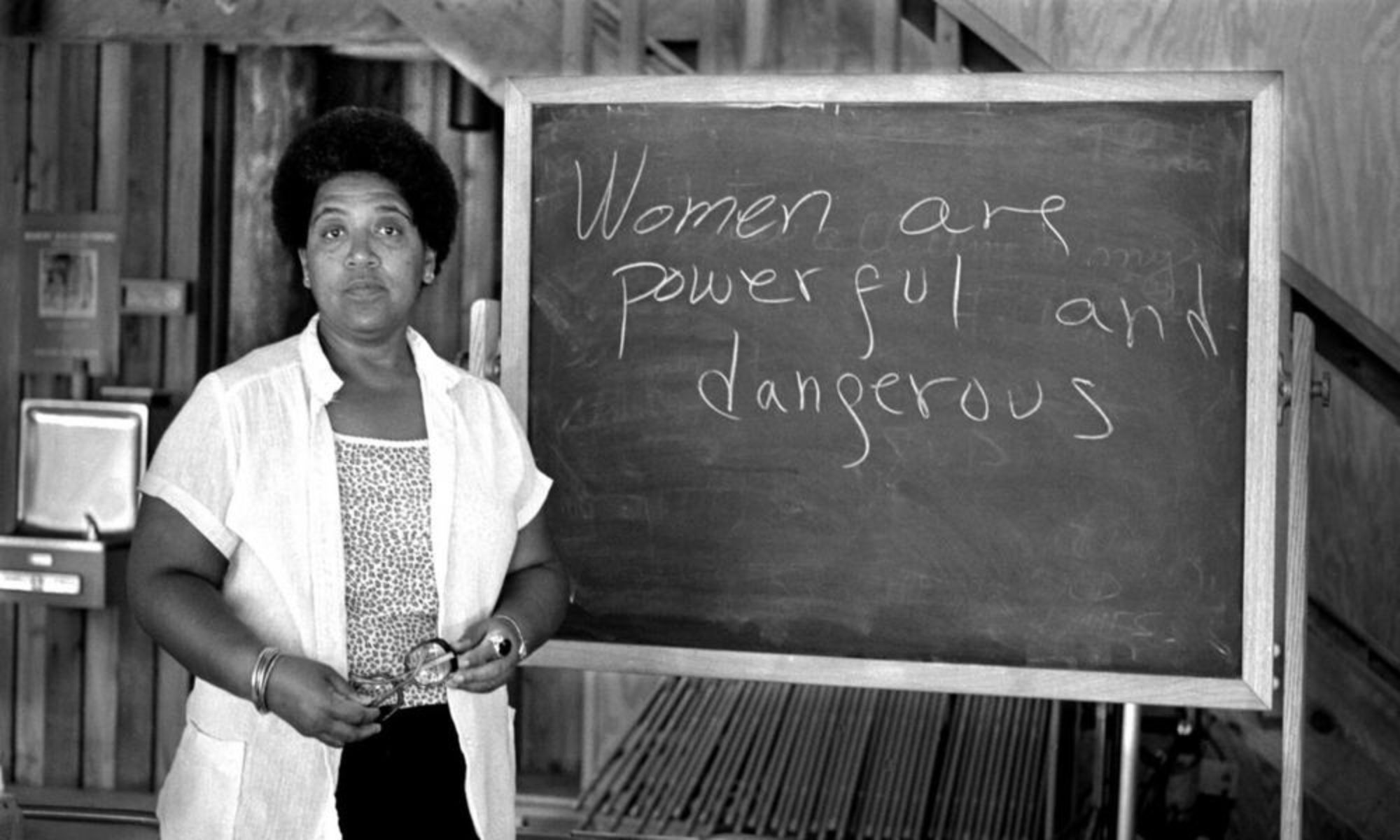Independent Study: Annotated Bibliography
- Dixon, Marlene. “Wages for Housework and Strategies of Revolutionary Fantasy.” Synthesis, vol. 1, no. 4, 1977, pp. 12–17. JSTOR, www.jstor.org/stable/43783331.
This source explains how feminist fought for equality. Not only equality in society, but also equality at home. This provides more information for the basis of my topic. Great reasoning on why this cause was important to women and the steps they took to bring about awareness. - Knight, Sophie. “My Husband Paid Me to Do Housework.” The Atlantic, Atlantic Media Company, 25 Sept. 2019, www.theatlantic.com/family/archive/2019/09/pay-women-housework/598729/.
In this article, a wife sends her husband invoices for the work housework she completes. She knows it sounds absurd for a husband to pay his wife for housework, but she believes work is work. It relates to my topic because it gives a real life example of the situation. I have heard of movements demanding this just to make a point, but this article actually poses the situation, literally. This offers great insight for my project. - Moran, Porcshe N., et al. “Wages for Housework.” The New York Times, The New York Times, 2014, www.nytimes.com/roomfordebate/2014/09/09/wages-for-housework/taking-unpaid-housework-for-granted-is-wrong.
I really like this source because it is not so one-sided. It is a debate between both men and women on the topic. Some agree that wages should be put in place for housework, but others disagree. Those who oppose it, say that putting monetary value on housework turns a marriage into employer-employee relations. I never thought about it like that, so it offers some fresh insight to my project. - Rampton, Martha. “Four Waves of Feminism.” Pacific University, Pacific University, 21 Nov. 2019, www.pacificu.edu/magazine/four-waves-feminism.
This article explains the four waves of feminism and the important ideologies and events that took place. I believe this will strengthen my project because it tells when the wages against housework movement started and what wave it was established. But it also serves as a contrast as to why it came about when it did. This source will also offer my project more clarification and understanding. - “Wages Against Housework.” Wages against Housework, by Silvia Federici, Falling Wall Press, 1975, pp. 2–8.
Here, Federici demands wages for housework to prove a point. I don’t think she means it literally. But she tries to prove that housework is work. Women have the responsibilities of a companion, cook, babysitter, cleaner and more. All of these positions are jobs that demand wages. Just like anyone in the workforce who performs these tasks, women should be looked at on the same level.This book is the core of my project. Her ideologies are very interesting to me. It provides logic and evidence to my project and might make it even more persuasive.

Blog Post 14: What I’ve Learned
Three readings or work that were most impactful for me was Gender Trouble by Judith Butler, “Ain’t I a Woman”’ by Sojourner Truth and Disidentifications by Munoz. All three readings were very refreshing and offered a new approach to many things. In Gender Trouble, Butler touched on a topic that many refuse or hesitate to talk about. I never really looked at gender as a performance until she mentioned it. Her reasoning behind the importance of language and term to describe a gender, or even women in general made me even more cautious. I also think the representation and how women and other people are represented should be done so in a thoughtful way.
The “Ain’t I A Woman” speech and recollection was very powerful. Before reading and presenting on this topic, I did not know Sojourner Truth was even involved in women’s suffrage. I didn’t even know she was present at the Convention. Many of parts of her life are rarely mentioned and this proved to be one of them. Knowing what I know now, I feel even more empowered.
Disidentification by Munoz proved that transgression is very important. I have learned about disidentification before, but in another aspect. This work showed the defiant courage of many people. Risking their reputation to bring change and to stand out. Not many people know what it is to disidentify, so it is very inspiring to hear about those who do.
All of these topics define feminism. The feminist ability to stand out, stand out, and keep fighting even when it may seem like all odds are against them. To me, being a feminist takes great courage and resilience especially in today’s society. During women’s suffrage, there were many anti-suffragists that try to discontinue and discredit the movement. From what I’ve seen and learned in class, some women were labeled as crazy and inadequate just because they thought differently and dared to speak out against inequality. It just proves that the world is very complex, but change happens all over and some stories are untold. There are actual risk takers and throughout history, their fight reached heights.

Independent Study Bibliography: Wages for Housework
- Dixon, Marlene. “Wages for Housework and Strategies of Revolutionary Fantasy.” Synthesis, vol. 1, no. 4, 1977, pp. 12–17. JSTOR, www.jstor.org/stable/43783331. Accessed 6 May 2020. This is academically credible because it was published in a scholarly journal and has been peer-reviewed and is written by experts in the social science and political science field.
- Knight, Sophie. “My Husband Paid Me to Do Housework.” The Atlantic, Atlantic Media Company, 25 Sept. 2019, www.theatlantic.com/family/archive/2019/09/pay-women-housework/598729/. The Atlantic is generally seen as a reliable source. All news stories on The Atlantic are properly sourced to factual information and usually present a reasonable balance on issues.
- Moran, Porcshe N., et al. “Wages for Housework.” The New York Times, The New York Times, 2014, www.nytimes.com/roomfordebate/2014/09/09/wages-for-housework/taking-unpaid-housework-for-granted-is-wrong. The NYT is highly factual and considered one of the most reliable sources for news information due to proper sourcing and well respected journalists/editors. The articles regarding this topic are also written by respected writers, professors and journalists.
- Rampton, Martha. “Four Waves of Feminism.” Pacific University, Pacific University, 21 Nov. 2019, www.pacificu.edu/magazine/four-waves-feminism. This article is reliable by academic standards because it was written by Martha Rampton (PhD) who works at Pacific University.Martha Rampton is Professor of History at Pacific University. She concentrates on the early medieval period with an emphasis on social history and the activities and roles of women. This source is also unbiased and is supported with evidence and factual based statements from an exp=
- “Wages Against Housework.” Wages against Housework, by Silvia Federici, Falling Wall Press, 1975, pp. 2–8. This book is reliable because it was written by Silvia Federici who is an Italian and American scholar, & teacher. She was a very important voice during second wave feminism and used this book to express her views.
Blog Post 12: Material Feminism
Material Feminism focuses on how nonhuman forces affect our agency, being, and culture. These material conditions can be looked at in terms of gender and relations to the actual lives of women. According to Jane Bennet, “these material powers, which can aid or destroy, enrich or disable, ennoble or degrade us, in any case call for our attentiveness, or even “respect”.” Mel Chen also focuses on similar forces such as “Words,” “Animals,” and “Metals.” She explains how matter that is considered immobile or insensate animates cultural lives.
This side of feminism offers us a new outlook on the diversity of feminism when it comes to the ideologies. It is a broad spectrum that touches every aspect. This offers us a more “material” perspective, by that I mean that it shows us that not only society and other humans affect our roles and who we are. Inanimate matter can affect our body, how we view certain issues and society as a whole.

Blog Post 13: Book Report
God Help the Child by Toni Morrison
This book explains the life of an African American woman named b=Bride and how she was able to get past a life of struggle and become a successful woman. However, even as an adult the events of her childhood still haunts her.
The book starts off by explaining the birth of Bride formerly known as Lula Anne Bridewell, who was born darker than both of her parents. Her father Louis, believed that Lula Anne was not his child because he had a “yellow” complexion and the baby was midnight black. Due to this, he left his child and his wife after 3 years. Bride did not have the easiest childhood as her mother prohibited her from calling her “mom” or “mother.” Instead, she told her forsaken daughter to address her by her first name, Sweetness. Sweetness sees Lula Ann’s color as “a cross she will always carry.”
By the time she reaches an adult, she makes drastic changes to her “countrified” name and decides to name herself Bride, no last name. Bride is living with her boyfriend Booker Starbern, who she barely knows anything about. She is willing to stay with him as long as he treats her like the center of his universe. But after seemingly small argument, Starbern leaves Bride behind.
Even though Bride is saddened by the loss of her boyfriend, she is more focused on the release of Sofia Huxley, a child molester that she falsely testified against. She visits Huxley upon her release date and carries a couple thousand in cash, an airline ticket, products from her cosmetics line and more gifts to greet Huxley. Unfortunately, Huxley is not pleased by her presence and beats her until she needs plastic surgery to reach near recognition.
Towards the end, Bride goes on a search for her ex-boyfriend and to find out more about who he is. She finds him, but things take a turn for the worse. Her friend who helped her find her ex-boyfriend died in a house fire after returning from helping Bride and Starbern settle their differences. After her friend’s death, Bride tells Starbern her situation and what she’s been through and lets him know that she is pregnant with his child.
The book ends with Bride’s mother in a nursing home telling the story of her daughter and although she is happy about having a grandchild, she knows she will probably never get to see this child.
This connects to Morrison’s point of racism in Playing In The Dark. Although what happens in this book is not exactly racism, it is still some form of discrimination that results to similar disparities that Morrison mentions. In her essay, Morrison basically says that to evade race in literature is an act of racism. Bride’s parents refusal to accept her color is an effect of racism. The darker black is always seen as less of amongst the whole race. According to Morrison, skin color creates a polarity (38). This polarity is seen in the life of Bride, the moment she came out of her mother’s womb. Morrsion also mentions that there are certain things you cannot mention in literature such as freedom, class, race and not include the notion of blackness. There are certain things that would not exist if it were not for the lives of African Americans.

Blog Post 6: Oral History
My mom was born in the early 70’s in St. Vincent and the Grenadines, but lived most of her life on the island on Mustique before coming to the USA in the early 2000’s.
Q: When you were living back home did you see a lot of movements and activism for women’s rights?
A: No
Q: Did you feel like women during your time had a voice or a dominant place in society?
A: I am not sure, because I lived in Mustique [small private island]. So I did not really question or was not really exposed to things like that. I never felt that division while living there. But I did remember the Teachers Union March in St.Vincent.
Q: What was that about?
A: A group of teachers walked out to protest their rights on certain things, it was a powerful thing, but still sad.
Q: Was it successful? Did it bring about any change?
A: Very little change. The Prime Minister at the time, ordered troops to tear gas them during the protest.
Many countries are not as powerful and educated as America. We just go with the flow sometimes. Women knew their place and stuck to it. I never questioned my role as a woman.
- My mother also detailed to me about a time she was slapped by my grandmother for not giving food to her step-father at the time. She felt like as the man of the house he had a responsibility to take care of them. But my mom had to support my grandmother and her 5 other siblings, along with her step-father. My grandmother enforced obedience to men in the household. My mom also mentioned that her role as the care-taker and the bread-winner gave her a sense of independence and she thinks it made her the strong and assertive person she is today.
Blog Post 11: Judith Butler – Gender Trouble
Judith Butler talks about therepresentation of feminists, women and gender. Whether it is political, cultural or social, how one represents a gender or speaks on it, is very important. She point out terminology can be either revealing or deceiving. For gender to be a performance, it means that it is not something that is established, rather it is something that is portrayed through performance. That performance is in the way an individual walks, talks, acts or even dresses. By these means, society identifies or try to indetify a gender. It is inscribed in our daily practices and is performed based on social and cultural norms of what represents maculinity or feminity. For example, in one of Butler’s video she recalls someone approached her and asked her if she was a lesbian because I guess she was acting and looking what is considered to be masculine. When Butler answered “yes,” the woman was surprised.

Gender Trouble – Judith Butler
This is the link to my Judith Butler Presentation, so I couldn’t upload the whole thing as a post.
Post # 10: Culture Wars
From what I understand from the Faluci reading, culture wars are the war between different cultures based on their views, beliefs or norms. But in this case, the war is between women, men or even society. The war is against the stigma and definition that are placed on women and the way other cultures seek to define them. This relates to feminism because it goes against the very virtues of what feminism stand on. According to Faluci, “Feminism’s agenda is basic: It asks that women not be forced to “choose” between public justice and private happiness. It asks that women be free to define themselves—instead of having their identity defined for them, time and again, by their culture and their men. “ The culture wars are based on notions that are put in place about women, but also how cultural and social factors sometimes put women at a disadvantage.



